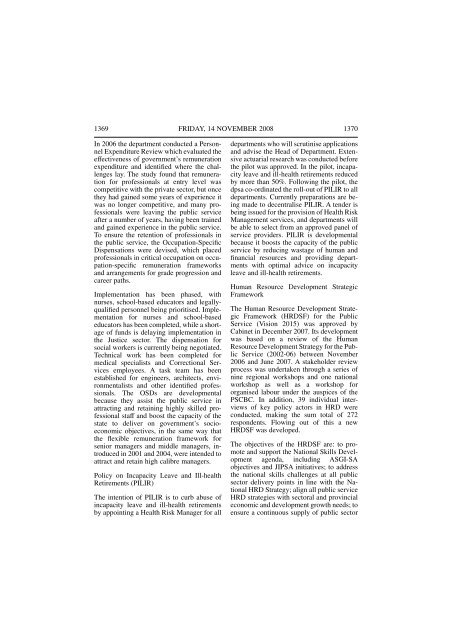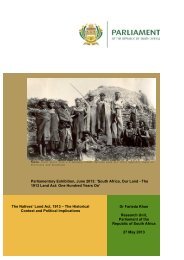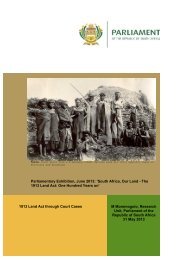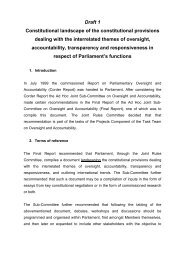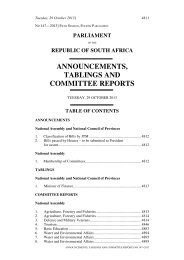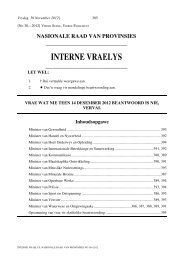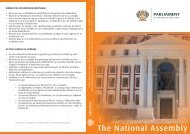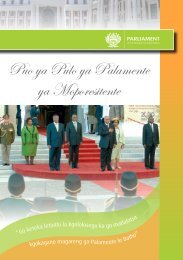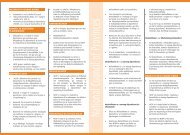- Page 1:
REPUBLIC OF SOUTH AFRICA NATIONAL A
- Page 4 and 5:
PRINTED BY CREDA COMMUNICATIONS
- Page 6 and 7:
Justice and Constitutional Developm
- Page 8 and 9:
Social Development, 100, 115, 126,
- Page 11 and 12:
INDEX TO QUESTIONS TO THE EXECUTIVE
- Page 13 and 14:
REPUBLIC OF SOUTH AFRICA ———
- Page 15 and 16:
5 WEDNESDAY, 1 OCTOBER 2008 6 Manag
- Page 17 and 18:
9 WEDNESDAY, 1 OCTOBER 2008 10 Mana
- Page 19 and 20:
13 WEDNESDAY, 1 OCTOBER 2008 14 vis
- Page 21 and 22:
17 WEDNESDAY, 1 OCTOBER 2008 18 and
- Page 23 and 24:
21 THURSDAY, 2 OCTOBER 2008 22 cial
- Page 25 and 26:
25 THURSDAY, 2 OCTOBER 2008 26 have
- Page 27 and 28:
29 THURSDAY, 2 OCTOBER 2008 30 Prov
- Page 29 and 30:
33 THURSDAY, 2 OCTOBER 2008 34 The
- Page 31 and 32:
37 THURSDAY, 2 OCTOBER 2008 38 Seta
- Page 33 and 34:
41 THURSDAY, 2 OCTOBER 2008 42 Seta
- Page 35 and 36:
45 THURSDAY, 2 OCTOBER 2008 46 paid
- Page 37 and 38:
49 THURSDAY, 2 OCTOBER 2008 50 comp
- Page 39 and 40:
53 FRIDAY, 3 OCTOBER 2008 54 The MI
- Page 41 and 42:
57 FRIDAY, 3 OCTOBER 2008 58 (b) (i
- Page 43 and 44:
61 MONDAY, 6 OCTOBER 2008 62 QUESTI
- Page 45 and 46:
65 MONDAY, 6 OCTOBER 2008 66 The MI
- Page 47 and 48:
69 TUESDAY, 7 OCTOBER 2008 70 QUEST
- Page 49 and 50:
73 TUESDAY, 7 OCTOBER 2008 74 Depar
- Page 51 and 52:
77 TUESDAY, 7 OCTOBER 2008 78 Gaute
- Page 53 and 54:
81 TUESDAY, 7 OCTOBER 2008 82 hospi
- Page 55 and 56:
85 TUESDAY, 7 OCTOBER 2008 86 close
- Page 57 and 58:
89 TUESDAY, 7 OCTOBER 2008 90 credi
- Page 59 and 60:
93 TUESDAY, 7 OCTOBER 2008 94 In th
- Page 61 and 62:
97 TUESDAY, 7 OCTOBER 2008 98 rende
- Page 63 and 64:
101 TUESDAY, 7 OCTOBER 2008 102 The
- Page 65 and 66:
105 TUESDAY, 7 OCTOBER 2008 106 Act
- Page 67 and 68:
109 TUESDAY, 7 OCTOBER 2008 110 Tru
- Page 69 and 70:
113 TUESDAY, 7 OCTOBER 2008 114 Nat
- Page 71 and 72:
117 TUESDAY, 7 OCTOBER 2008 118 Whe
- Page 73 and 74:
121 TUESDAY, 7 OCTOBER 2008 122 The
- Page 75 and 76:
125 TUESDAY, 7 OCTOBER 2008 126 Pro
- Page 77 and 78:
129 TUESDAY, 7 OCTOBER 2008 130 gro
- Page 79 and 80:
133 TUESDAY, 7 OCTOBER 2008 134 3.
- Page 81 and 82:
137 TUESDAY, 7 OCTOBER 2008 138 Pri
- Page 83 and 84:
141 TUESDAY, 7 OCTOBER 2008 142 Pro
- Page 85 and 86:
145 WEDNESDAY, 8 OCTOBER 2008 146 N
- Page 87 and 88:
149 WEDNESDAY, 8 OCTOBER 2008 150 4
- Page 89 and 90:
153 WEDNESDAY, 8 OCTOBER 2008 154 (
- Page 91 and 92:
157 WEDNESDAY, 8 OCTOBER 2008 158 4
- Page 93 and 94:
161 THURSDAY, 9 OCTOBER 2008 162 Se
- Page 95 and 96:
165 THURSDAY, 9 OCTOBER 2008 166
- Page 97 and 98:
169 THURSDAY, 9 OCTOBER 2008 170 Se
- Page 99 and 100:
173 THURSDAY, 9 OCTOBER 2008 174 Se
- Page 101 and 102:
177 THURSDAY, 9 OCTOBER 2008 178 [P
- Page 103 and 104:
181 THURSDAY, 9 OCTOBER 2008 182 ar
- Page 105 and 106:
185 THURSDAY, 9 OCTOBER 2008 186 de
- Page 107 and 108:
189 THURSDAY, 9 OCTOBER 2008 190 S/
- Page 109 and 110:
193 THURSDAY, 9 OCTOBER 2008 194 C&
- Page 111 and 112:
197 THURSDAY, 9 OCTOBER 2008 198 Pe
- Page 113 and 114:
201 THURSDAY, 9 OCTOBER 2008 202 Pi
- Page 115 and 116:
205 THURSDAY, 9 OCTOBER 2008 206 Pr
- Page 117 and 118:
209 THURSDAY, 9 OCTOBER 2008 210 Ca
- Page 119 and 120:
213 THURSDAY, 9 OCTOBER 2008 214 Su
- Page 121 and 122:
217 THURSDAY, 9 OCTOBER 2008 218 Pr
- Page 123 and 124:
221 THURSDAY, 9 OCTOBER 2008 222 Su
- Page 125 and 126:
225 THURSDAY, 9 OCTOBER 2008 226 Pr
- Page 127 and 128:
229 THURSDAY, 9 OCTOBER 2008 230 Se
- Page 129 and 130:
233 FRIDAY, 10 OCTOBER 2008 234 (2)
- Page 131 and 132:
237 FRIDAY, 10 OCTOBER 2008 238 Vac
- Page 133 and 134:
241 FRIDAY, 10 OCTOBER 2008 242 DAT
- Page 135 and 136:
245 FRIDAY, 10 OCTOBER 2008 246 200
- Page 137 and 138:
249 FRIDAY, 10 OCTOBER 2008 250 DAT
- Page 139 and 140:
253 FRIDAY, 10 OCTOBER 2008 254 DAT
- Page 141 and 142:
257 FRIDAY, 10 OCTOBER 2008 258 200
- Page 143 and 144:
261 FRIDAY, 10 OCTOBER 2008 262
- Page 145 and 146:
265 FRIDAY, 10 OCTOBER 2008 266
- Page 147 and 148:
269 FRIDAY, 10 OCTOBER 2008 270
- Page 149 and 150:
273 FRIDAY, 10 OCTOBER 2008 274
- Page 151 and 152:
277 FRIDAY, 10 OCTOBER 2008 278
- Page 153 and 154:
281 FRIDAY, 10 OCTOBER 2008 282
- Page 155 and 156:
285 FRIDAY, 10 OCTOBER 2008 286
- Page 157 and 158:
289 FRIDAY, 10 OCTOBER 2008 290
- Page 159 and 160:
293 FRIDAY, 10 OCTOBER 2008 294
- Page 161 and 162:
297 FRIDAY, 10 OCTOBER 2008 298
- Page 163 and 164:
301 FRIDAY, 10 OCTOBER 2008 302
- Page 165 and 166:
305 FRIDAY, 10 OCTOBER 2008 306
- Page 167 and 168:
309 FRIDAY, 10 OCTOBER 2008 310
- Page 169 and 170:
313 FRIDAY, 10 OCTOBER 2008 314
- Page 171 and 172:
317 FRIDAY, 10 OCTOBER 2008 318
- Page 173 and 174:
321 FRIDAY, 10 OCTOBER 2008 322
- Page 175 and 176:
325 FRIDAY, 10 OCTOBER 2008 326
- Page 177 and 178:
329 FRIDAY, 10 OCTOBER 2008 330
- Page 179 and 180:
333 FRIDAY, 10 OCTOBER 2008 334
- Page 181 and 182:
337 FRIDAY, 10 OCTOBER 2008 338
- Page 183 and 184:
341 FRIDAY, 10 OCTOBER 2008 342
- Page 185 and 186:
345 FRIDAY, 10 OCTOBER 2008 346
- Page 187 and 188:
349 FRIDAY, 10 OCTOBER 2008 350
- Page 189 and 190:
353 FRIDAY, 10 OCTOBER 2008 354
- Page 191 and 192:
357 FRIDAY, 10 OCTOBER 2008 358
- Page 193 and 194:
361 FRIDAY, 10 OCTOBER 2008 362
- Page 195 and 196:
365 FRIDAY, 10 OCTOBER 2008 366
- Page 197 and 198:
369 FRIDAY, 10 OCTOBER 2008 370
- Page 199 and 200:
373 FRIDAY, 10 OCTOBER 2008 374
- Page 201 and 202:
377 FRIDAY, 10 OCTOBER 2008 378
- Page 203 and 204:
381 FRIDAY, 10 OCTOBER 2008 382
- Page 205 and 206:
385 FRIDAY, 10 OCTOBER 2008 386
- Page 207 and 208:
389 FRIDAY, 10 OCTOBER 2008 390
- Page 209 and 210:
393 FRIDAY, 10 OCTOBER 2008 394
- Page 211 and 212:
397 FRIDAY, 10 OCTOBER 2008 398
- Page 213 and 214:
401 FRIDAY, 10 OCTOBER 2008 402
- Page 215 and 216:
405 FRIDAY, 10 OCTOBER 2008 406
- Page 217 and 218:
409 FRIDAY, 10 OCTOBER 2008 410
- Page 219 and 220:
413 FRIDAY, 10 OCTOBER 2008 414
- Page 221 and 222:
417 FRIDAY, 10 OCTOBER 2008 418
- Page 223 and 224:
421 FRIDAY, 10 OCTOBER 2008 422
- Page 225 and 226:
425 FRIDAY, 10 OCTOBER 2008 426
- Page 227 and 228:
429 FRIDAY, 10 OCTOBER 2008 430
- Page 229 and 230:
433 FRIDAY, 10 OCTOBER 2008 434
- Page 231 and 232:
437 FRIDAY, 10 OCTOBER 2008 438
- Page 233 and 234:
441 FRIDAY, 10 OCTOBER 2008 442
- Page 235 and 236:
445 FRIDAY, 10 OCTOBER 2008 446
- Page 237 and 238:
449 FRIDAY, 10 OCTOBER 2008 450
- Page 239 and 240:
453 FRIDAY, 10 OCTOBER 2008 454
- Page 241 and 242:
457 FRIDAY, 10 OCTOBER 2008 458
- Page 243 and 244:
461 FRIDAY, 10 OCTOBER 2008 462
- Page 245 and 246:
465 FRIDAY, 10 OCTOBER 2008 466
- Page 247 and 248:
469 FRIDAY, 10 OCTOBER 2008 470
- Page 249 and 250:
473 FRIDAY, 10 OCTOBER 2008 474
- Page 251 and 252:
477 FRIDAY, 10 OCTOBER 2008 478
- Page 253 and 254:
481 FRIDAY, 10 OCTOBER 2008 482
- Page 255 and 256:
485 FRIDAY, 10 OCTOBER 2008 486
- Page 257 and 258:
489 FRIDAY, 10 OCTOBER 2008 490
- Page 259 and 260:
493 FRIDAY, 10 OCTOBER 2008 494
- Page 261 and 262:
497 FRIDAY, 10 OCTOBER 2008 498
- Page 263 and 264:
501 FRIDAY, 10 OCTOBER 2008 502
- Page 265 and 266:
505 FRIDAY, 10 OCTOBER 2008 506
- Page 267 and 268:
509 FRIDAY, 10 OCTOBER 2008 510 Ove
- Page 269 and 270:
513 FRIDAY, 10 OCTOBER 2008 514 The
- Page 271 and 272:
517 MONDAY, 13 NOVEMBER 2008 518 er
- Page 273 and 274:
521 MONDAY, 13 NOVEMBER 2008 522 20
- Page 275 and 276:
525 TUESDAY, 14 OCTOBER 2008 526 QU
- Page 277 and 278:
529 TUESDAY, 14 OCTOBER 2008 530 20
- Page 279 and 280:
533 TUESDAY, 14 OCTOBER 2008 534 20
- Page 281 and 282:
537 TUESDAY, 14 OCTOBER 2008 538 Da
- Page 283 and 284:
541 TUESDAY, 14 OCTOBER 2008 542 20
- Page 285 and 286:
545 TUESDAY, 14 OCTOBER 2008 546 Da
- Page 287 and 288:
549 TUESDAY, 14 OCTOBER 2008 550 Th
- Page 289 and 290:
553 TUESDAY, 14 OCTOBER 2008 554 fo
- Page 291 and 292:
557 TUESDAY, 14 OCTOBER 2008 558 CO
- Page 293 and 294:
561 TUESDAY, 14 OCTOBER 2008 562 CO
- Page 295 and 296:
565 WEDNESDAY, 15 OCTOBER 2008 566
- Page 297 and 298:
569 THURSDAY, 16 OCTOBER 2008 570 P
- Page 299 and 300:
573 THURSDAY, 16 OCTOBER 2008 574 t
- Page 301 and 302:
577 THURSDAY, 16 OCTOBER 2008 578 a
- Page 303 and 304:
581 THURSDAY, 16 OCTOBER 2008 582 (
- Page 305 and 306:
585 THURSDAY, 16 OCTOBER 2008 586 (
- Page 307 and 308:
589 THURSDAY, 16 OCTOBER 2008 590 E
- Page 309 and 310:
593 THURSDAY, 16 OCTOBER 2008 594 E
- Page 311 and 312:
597 FRIDAY, 17 OCTOBER 2008 598 The
- Page 313 and 314:
601 FRIDAY, 17 OCTOBER 2008 602 Kwa
- Page 315 and 316:
605 FRIDAY, 17 OCTOBER 2008 606 Ran
- Page 317 and 318:
609 FRIDAY, 17 OCTOBER 2008 610 Ran
- Page 319 and 320:
613 FRIDAY, 17 OCTOBER 2008 614 Bul
- Page 321 and 322:
617 FRIDAY, 17 OCTOBER 2008 618 all
- Page 323 and 324:
621 FRIDAY, 17 OCTOBER 2008 622 Num
- Page 325 and 326:
625 MONDAY, 20 OCTOBER 2008 626 lat
- Page 327 and 328:
629 MONDAY, 20 OCTOBER 2008 630 TAB
- Page 329 and 330:
633 MONDAY, 20 OCTOBER 2008 634 (2)
- Page 331 and 332:
637 MONDAY, 20 OCTOBER 2008 638 yea
- Page 333 and 334:
641 MONDAY, 20 OCTOBER 2008 642 Dep
- Page 335 and 336:
645 TUESDAY, 21 OCTOBER 2008 646 Ma
- Page 337 and 338:
649 TUESDAY, 21 OCTOBER 2008 650 Ac
- Page 339 and 340:
653 TUESDAY, 21 OCTOBER 2008 654 Bo
- Page 341 and 342:
657 TUESDAY, 21 OCTOBER 2008 658 Mu
- Page 343 and 344:
661 TUESDAY, 21 OCTOBER 2008 662 (3
- Page 345 and 346:
665 TUESDAY, 21 OCTOBER 2008 666 In
- Page 347 and 348:
669 TUESDAY, 21 OCTOBER 2008 670 po
- Page 349 and 350:
673 TUESDAY, 21 OCTOBER 2008 674 Pr
- Page 351 and 352:
677 WEDNESDAY, 22 OCTOBER 2008 678
- Page 353 and 354:
681 WEDNESDAY, 22 OCTOBER 2008 682
- Page 355 and 356:
685 WEDNESDAY, 22 OCTOBER 2008 686
- Page 357 and 358:
689 WEDNESDAY, 22 OCTOBER 2008 690
- Page 359 and 360:
693 WEDNESDAY, 22 OCTOBER 2008 694
- Page 361 and 362:
697 WEDNESDAY, 22 OCTOBER 2008 698
- Page 363 and 364:
701 WEDNESDAY, 22 OCTOBER 2008 702
- Page 365 and 366:
705 WEDNESDAY, 22 OCTOBER 2008 706
- Page 367 and 368:
709 WEDNESDAY, 22 OCTOBER 2008 710
- Page 369 and 370:
713 THURSDAY, 23 OCTOBER 2008 714 Q
- Page 371 and 372:
717 THURSDAY, 23 OCTOBER 2008 718 p
- Page 373 and 374:
721 THURSDAY, 23 OCTOBER 2008 722 l
- Page 375 and 376:
725 THURSDAY, 23 OCTOBER 2008 726 d
- Page 377 and 378:
729 THURSDAY, 23 OCTOBER 2008 730 p
- Page 379 and 380:
733 FRIDAY, 24 OCTOBER 2008 734 QUE
- Page 381 and 382:
737 FRIDAY, 24 OCTOBER 2008 738 Ran
- Page 383 and 384:
741 FRIDAY, 24 OCTOBER 2008 742 dia
- Page 385 and 386:
745 FRIDAY, 24 OCTOBER 2008 746 dur
- Page 387 and 388:
749 FRIDAY, 24 OCTOBER 2008 750 Tot
- Page 389 and 390:
753 FRIDAY, 24 OCTOBER 2008 754 tru
- Page 391 and 392:
757 FRIDAY, 24 OCTOBER 2008 758 his
- Page 393 and 394:
761 FRIDAY, 24 OCTOBER 2008 762
- Page 395 and 396:
765 FRIDAY, 24 OCTOBER 2008 766 Ent
- Page 397 and 398:
769 FRIDAY, 24 OCTOBER 2008 770 The
- Page 399 and 400:
773 FRIDAY, 24 OCTOBER 2008 774 ene
- Page 401 and 402:
777 FRIDAY, 24 OCTOBER 2008 778 ●
- Page 403 and 404:
781 MONDAY, 27 OCTOBER 2008 782 (ii
- Page 405 and 406:
785 MONDAY, 27 OCTOBER 2008 786 is
- Page 407 and 408:
789 MONDAY, 27 OCTOBER 2008 790 ●
- Page 409 and 410:
793 MONDAY, 27 OCTOBER 2008 794 ●
- Page 411 and 412:
797 MONDAY, 27 OCTOBER 2008 798 cur
- Page 413 and 414:
801 MONDAY, 27 OCTOBER 2008 802 car
- Page 415 and 416:
805 MONDAY, 27 OCTOBER 2008 806 Ran
- Page 417 and 418:
809 MONDAY, 27 OCTOBER 2008 810 are
- Page 419 and 420:
813 TUESDAY, 28 OCTOBER 2008 814 Pa
- Page 421 and 422:
817 WEDNESDAY, 29 OCTOBER 2008 818
- Page 423 and 424:
821 WEDNESDAY, 29 OCTOBER 2008 822
- Page 425 and 426:
825 WEDNESDAY, 29 OCTOBER 2008 826
- Page 427 and 428:
829 WEDNESDAY, 29 OCTOBER 2008 830
- Page 429 and 430:
833 WEDNESDAY, 29 OCTOBER 2008 834
- Page 431 and 432:
837 WEDNESDAY, 29 OCTOBER 2008 838
- Page 433 and 434:
841 WEDNESDAY, 29 OCTOBER 2008 842
- Page 435 and 436:
845 THURSDAY, 30 OCTOBER 2008 846 Q
- Page 437 and 438:
849 THURSDAY, 30 OCTOBER 2008 850 c
- Page 439 and 440:
853 THURSDAY, 30 OCTOBER 2008 854 e
- Page 441 and 442:
857 THURSDAY, 30 OCTOBER 2008 858 T
- Page 443 and 444:
861 THURSDAY, 30 OCTOBER 2008 862 s
- Page 445 and 446:
865 MONDAY, 3 NOVEMBER 2008 866 QUE
- Page 447 and 448:
869 MONDAY, 3 NOVEMBER 2008 870 (aa
- Page 449 and 450:
873 TUESDAY, 4 NOVEMBER 2008 874 (b
- Page 451 and 452:
877 TUESDAY, 4 NOVEMBER 2008 878 (b
- Page 453 and 454:
881 TUESDAY, 4 NOVEMBER 2008 882 (b
- Page 455 and 456:
885 THURSDAY, 6 NOVEMBER 2008 886 Q
- Page 457 and 458:
889 THURSDAY, 6 NOVEMBER 2008 890 2
- Page 459 and 460:
893 FRIDAY, 7 NOVEMBER 2008 894 QUE
- Page 461 and 462:
897 MONDAY, 10 NOVEMBER 2008 898 QU
- Page 463 and 464:
901 MONDAY, 10 NOVEMBER 2008 902 Re
- Page 465 and 466:
905 MONDAY, 10 NOVEMBER 2008 906 Qu
- Page 467 and 468:
909 MONDAY, 10 NOVEMBER 2008 910 ba
- Page 469 and 470:
913 MONDAY, 10 NOVEMBER 2008 914 (b
- Page 471 and 472:
917 TUESDAY, 11 NOVEMBER 2008 918 Q
- Page 473 and 474:
921 WEDNESDAY, 12 NOVEMBER 2008 922
- Page 475 and 476:
925 WEDNESDAY, 12 NOVEMBER 2008 926
- Page 477 and 478:
929 WEDNESDAY, 12 NOVEMBER 2008 930
- Page 479 and 480:
933 WEDNESDAY, 12 NOVEMBER 2008 934
- Page 481 and 482:
937 WEDNESDAY, 12 NOVEMBER 2008 938
- Page 483 and 484:
941 WEDNESDAY, 12 NOVEMBER 2008 942
- Page 485 and 486:
945 WEDNESDAY, 12 NOVEMBER 2008 946
- Page 487 and 488:
949 WEDNESDAY, 12 NOVEMBER 2008 950
- Page 489 and 490:
953 WEDNESDAY, 12 NOVEMBER 2008 954
- Page 491 and 492:
957 WEDNESDAY, 12 NOVEMBER 2008 958
- Page 493 and 494:
961 WEDNESDAY, 12 NOVEMBER 2008 962
- Page 495 and 496:
965 WEDNESDAY, 12 NOVEMBER 2008 966
- Page 497 and 498:
969 WEDNESDAY, 12 NOVEMBER 2008 970
- Page 499 and 500:
973 WEDNESDAY, 12 NOVEMBER 2008 974
- Page 501 and 502:
977 WEDNESDAY, 12 NOVEMBER 2008 978
- Page 503 and 504:
981 WEDNESDAY, 12 NOVEMBER 2008 982
- Page 505 and 506:
985 WEDNESDAY, 12 NOVEMBER 2008 986
- Page 507 and 508:
989 WEDNESDAY, 12 NOVEMBER 2008 990
- Page 509 and 510:
993 WEDNESDAY, 12 NOVEMBER 2008 994
- Page 511 and 512:
997 WEDNESDAY, 12 NOVEMBER 2008 998
- Page 513 and 514:
1001 WEDNESDAY, 12 NOVEMBER 2008 10
- Page 515 and 516:
1005 WEDNESDAY, 12 NOVEMBER 2008 10
- Page 517 and 518:
1009 WEDNESDAY, 12 NOVEMBER 2008 10
- Page 519 and 520:
1013 WEDNESDAY, 12 NOVEMBER 2008 10
- Page 521 and 522:
1017 WEDNESDAY, 12 NOVEMBER 2008 10
- Page 523 and 524:
1021 WEDNESDAY, 12 NOVEMBER 2008 10
- Page 525 and 526:
1025 WEDNESDAY, 12 NOVEMBER 2008 10
- Page 527 and 528:
1029 WEDNESDAY, 12 NOVEMBER 2008 10
- Page 529 and 530:
1033 WEDNESDAY, 12 NOVEMBER 2008 10
- Page 531 and 532:
1037 WEDNESDAY, 12 NOVEMBER 2008 10
- Page 533 and 534:
1041 WEDNESDAY, 12 NOVEMBER 2008 10
- Page 535 and 536:
1045 WEDNESDAY, 12 NOVEMBER 2008 10
- Page 537 and 538:
1049 WEDNESDAY, 12 NOVEMBER 2008 10
- Page 539 and 540:
1053 WEDNESDAY, 12 NOVEMBER 2008 10
- Page 541 and 542:
1057 WEDNESDAY, 12 NOVEMBER 2008 10
- Page 543 and 544:
1061 WEDNESDAY, 12 NOVEMBER 2008 10
- Page 545 and 546:
1065 WEDNESDAY, 12 NOVEMBER 2008 10
- Page 547 and 548:
1069 WEDNESDAY, 12 NOVEMBER 2008 10
- Page 549 and 550:
1073 WEDNESDAY, 12 NOVEMBER 2008 10
- Page 551 and 552:
1077 WEDNESDAY, 12 NOVEMBER 2008 10
- Page 553 and 554:
1081 WEDNESDAY, 12 NOVEMBER 2008 10
- Page 555 and 556:
1085 WEDNESDAY, 12 NOVEMBER 2008 10
- Page 557 and 558:
1089 WEDNESDAY, 12 NOVEMBER 2008 10
- Page 559 and 560:
1093 WEDNESDAY, 12 NOVEMBER 2008 10
- Page 561 and 562:
1097 WEDNESDAY, 12 NOVEMBER 2008 10
- Page 563 and 564:
1101 WEDNESDAY, 12 NOVEMBER 2008 11
- Page 565 and 566:
1105 WEDNESDAY, 12 NOVEMBER 2008 11
- Page 567 and 568:
1109 WEDNESDAY, 12 NOVEMBER 2008 11
- Page 569 and 570:
1113 WEDNESDAY, 12 NOVEMBER 2008 11
- Page 571 and 572:
1117 WEDNESDAY, 12 NOVEMBER 2008 11
- Page 573 and 574:
1121 WEDNESDAY, 12 NOVEMBER 2008 11
- Page 575 and 576:
1125 WEDNESDAY, 12 NOVEMBER 2008 11
- Page 577 and 578:
1129 WEDNESDAY, 12 NOVEMBER 2008 11
- Page 579 and 580:
1133 WEDNESDAY, 12 NOVEMBER 2008 11
- Page 581 and 582:
1137 WEDNESDAY, 12 NOVEMBER 2008 11
- Page 583 and 584:
1141 WEDNESDAY, 12 NOVEMBER 2008 11
- Page 585 and 586:
1145 WEDNESDAY, 12 NOVEMBER 2008 11
- Page 587 and 588:
1149 WEDNESDAY, 12 NOVEMBER 2008 11
- Page 589 and 590:
1153 WEDNESDAY, 12 NOVEMBER 2008 11
- Page 591 and 592:
1157 WEDNESDAY, 12 NOVEMBER 2008 11
- Page 593 and 594:
1161 WEDNESDAY, 12 NOVEMBER 2008 11
- Page 595 and 596:
1165 WEDNESDAY, 12 NOVEMBER 2008 11
- Page 597 and 598:
1169 WEDNESDAY, 12 NOVEMBER 2008 11
- Page 599 and 600:
1173 WEDNESDAY, 12 NOVEMBER 2008 11
- Page 601 and 602:
1177 WEDNESDAY, 12 NOVEMBER 2008 11
- Page 603 and 604:
1181 WEDNESDAY, 12 NOVEMBER 2008 11
- Page 605 and 606:
1185 WEDNESDAY, 12 NOVEMBER 2008 11
- Page 607 and 608:
1189 WEDNESDAY, 12 NOVEMBER 2008 11
- Page 609 and 610:
1193 WEDNESDAY, 12 NOVEMBER 2008 11
- Page 611 and 612:
1197 WEDNESDAY, 12 NOVEMBER 2008 11
- Page 613 and 614:
1201 WEDNESDAY, 12 NOVEMBER 2008 12
- Page 615 and 616:
1205 WEDNESDAY, 12 NOVEMBER 2008 12
- Page 617 and 618:
1209 WEDNESDAY, 12 NOVEMBER 2008 12
- Page 619 and 620:
1213 WEDNESDAY, 12 NOVEMBER 2008 12
- Page 621 and 622:
1217 WEDNESDAY, 12 NOVEMBER 2008 12
- Page 623 and 624:
1221 WEDNESDAY, 12 NOVEMBER 2008 12
- Page 625 and 626:
1225 WEDNESDAY, 12 NOVEMBER 2008 12
- Page 627 and 628:
1229 WEDNESDAY, 12 NOVEMBER 2008 12
- Page 629 and 630:
1233 WEDNESDAY, 12 NOVEMBER 2008 12
- Page 631 and 632:
1237 WEDNESDAY, 12 NOVEMBER 2008 12
- Page 633 and 634:
1241 WEDNESDAY, 12 NOVEMBER 2008 12
- Page 635 and 636:
1245 WEDNESDAY, 12 NOVEMBER 2008 12
- Page 637 and 638:
1249 WEDNESDAY, 12 NOVEMBER 2008 12
- Page 639 and 640:
1253 WEDNESDAY, 12 NOVEMBER 2008 12
- Page 641 and 642:
1257 WEDNESDAY, 12 NOVEMBER 2008 12
- Page 643 and 644:
1261 WEDNESDAY, 12 NOVEMBER 2008 12
- Page 645 and 646: 1265 WEDNESDAY, 12 NOVEMBER 2008 12
- Page 647 and 648: 1269 WEDNESDAY, 12 NOVEMBER 2008 12
- Page 649 and 650: 1273 WEDNESDAY, 12 NOVEMBER 2008 12
- Page 651 and 652: 1277 WEDNESDAY, 12 NOVEMBER 2008 12
- Page 653 and 654: 1281 WEDNESDAY, 12 NOVEMBER 2008 12
- Page 655 and 656: 1285 WEDNESDAY, 12 NOVEMBER 2008 12
- Page 657 and 658: 1289 WEDNESDAY, 12 NOVEMBER 2008 12
- Page 659 and 660: 1293 WEDNESDAY, 12 NOVEMBER 2008 12
- Page 661 and 662: 1297 WEDNESDAY, 12 NOVEMBER 2008 12
- Page 663 and 664: 1301 WEDNESDAY, 12 NOVEMBER 2008 13
- Page 665 and 666: 1305 WEDNESDAY, 12 NOVEMBER 2008 13
- Page 667 and 668: 1309 WEDNESDAY, 12 NOVEMBER 2008 13
- Page 669 and 670: 1313 THURSDAY, 13 NOVEMBER 2008 131
- Page 671 and 672: 1317 THURSDAY, 13 NOVEMBER 2008 131
- Page 673 and 674: 1321 THURSDAY, 13 NOVEMBER 2008 132
- Page 675 and 676: 1325 THURSDAY, 13 NOVEMBER 2008 132
- Page 677 and 678: 1329 THURSDAY, 13 NOVEMBER 2008 133
- Page 679 and 680: 1333 THURSDAY, 13 NOVEMBER 2008 133
- Page 681 and 682: 1337 THURSDAY, 13 NOVEMBER 2008 133
- Page 683 and 684: 1341 FRIDAY, 14 NOVEMBER 2008 1342
- Page 685 and 686: 1345 FRIDAY, 14 NOVEMBER 2008 1346
- Page 687 and 688: 1349 FRIDAY, 14 NOVEMBER 2008 1350
- Page 689 and 690: 1353 FRIDAY, 14 NOVEMBER 2008 1354
- Page 691 and 692: 1357 FRIDAY, 14 NOVEMBER 2008 1358
- Page 693 and 694: 1361 FRIDAY, 14 NOVEMBER 2008 1362
- Page 695: 1365 FRIDAY, 14 NOVEMBER 2008 1366
- Page 699 and 700: 1373 FRIDAY, 14 NOVEMBER 2008 1374
- Page 701 and 702: 1377 FRIDAY, 14 NOVEMBER 2008 1378
- Page 703 and 704: 1381 MONDAY, 17 NOVEMBER 2008 1382
- Page 705 and 706: 1385 MONDAY, 17 NOVEMBER 2008 1386
- Page 707 and 708: 1389 MONDAY, 17 NOVEMBER 2008 1390
- Page 709 and 710: 1393 MONDAY, 17 NOVEMBER 2008 1394
- Page 711 and 712: 1397 MONDAY, 17 NOVEMBER 2008 1398
- Page 713 and 714: 1401 MONDAY, 17 NOVEMBER 2008 1402
- Page 715 and 716: 1405 MONDAY, 17 NOVEMBER 2008 1406
- Page 717 and 718: 1409 MONDAY, 17 NOVEMBER 2008 1410
- Page 719 and 720: 1413 MONDAY, 17 NOVEMBER 2008 1414
- Page 721 and 722: 1417 MONDAY, 17 NOVEMBER 2008 1418
- Page 723 and 724: 1421 MONDAY, 17 NOVEMBER 2008 1422
- Page 725 and 726: 1425 TUESDAY, 18 NOVEMBER 2008 1426
- Page 727 and 728: 1429 TUESDAY, 18 NOVEMBER 2008 1430
- Page 729 and 730: 1433 TUESDAY, 18 NOVEMBER 2008 1434
- Page 731 and 732: 1437 WEDNESDAY, 19 NOVEMBER 2008 14
- Page 733 and 734: 1441 WEDNESDAY, 19 NOVEMBER 2008 14
- Page 735 and 736: 1445 WEDNESDAY, 19 NOVEMBER 2008 14
- Page 737 and 738: 1449 THURSDAY, 20 NOVEMBER 2008 145
- Page 739 and 740: 1453 THURSDAY, 20 NOVEMBER 2008 145
- Page 741 and 742: 1457 THURSDAY, 20 NOVEMBER 2008 145
- Page 743 and 744: 1461 THURSDAY, 20 NOVEMBER 2008 146
- Page 745 and 746: 1465 THURSDAY, 20 NOVEMBER 2008 146
- Page 747 and 748:
1469 THURSDAY, 20 NOVEMBER 2008 147
- Page 749 and 750:
1473 THURSDAY, 20 NOVEMBER 2008 147
- Page 751 and 752:
1477 THURSDAY, 20 NOVEMBER 2008 147
- Page 753 and 754:
1481 THURSDAY, 20 NOVEMBER 2008 148
- Page 755 and 756:
1485 THURSDAY, 20 NOVEMBER 2008 148
- Page 757 and 758:
1489 THURSDAY, 20 NOVEMBER 2008 149
- Page 759 and 760:
1493 THURSDAY, 20 NOVEMBER 2008 149
- Page 761 and 762:
1497 THURSDAY, 20 NOVEMBER 2008 149
- Page 763 and 764:
1501 THURSDAY, 20 NOVEMBER 2008 150
- Page 765 and 766:
1505 THURSDAY, 20 NOVEMBER 2008 150
- Page 767 and 768:
1509 THURSDAY, 20 NOVEMBER 2008 151
- Page 769 and 770:
1513 THURSDAY, 20 NOVEMBER 2008 151
- Page 771 and 772:
1517 THURSDAY, 20 NOVEMBER 2008 151
- Page 773 and 774:
1521 THURSDAY, 20 NOVEMBER 2008 152
- Page 775 and 776:
1525 THURSDAY, 20 NOVEMBER 2008 152
- Page 777 and 778:
1529 THURSDAY, 20 NOVEMBER 2008 153
- Page 779 and 780:
1533 THURSDAY, 20 NOVEMBER 2008 153
- Page 781 and 782:
1537 THURSDAY, 20 NOVEMBER 2008 153
- Page 783 and 784:
1541 FRIDAY, 21 NOVEMBER 2008 1542
- Page 785 and 786:
1545 FRIDAY, 21 NOVEMBER 2008 1546
- Page 787 and 788:
1549 FRIDAY, 21 NOVEMBER 2008 1550
- Page 789 and 790:
1553 TUESDAY, 25 NOVEMBER 2008 1554
- Page 791 and 792:
1557 TUESDAY, 25 NOVEMBER 2008 1558
- Page 793 and 794:
1561 FRIDAY, 28 NOVEMBER 2008 1562
- Page 795 and 796:
1565 FRIDAY, 28 NOVEMBER 2008 1566
- Page 797 and 798:
1569 FRIDAY, 28 NOVEMBER 2008 1570
- Page 799 and 800:
1573 FRIDAY, 28 NOVEMBER 2008 1574
- Page 801 and 802:
1577 FRIDAY, 28 NOVEMBER 2008 1578
- Page 803 and 804:
1581 FRIDAY, 28 NOVEMBER 2008 1582
- Page 805 and 806:
1585 FRIDAY, 28 NOVEMBER 2008 1586
- Page 807 and 808:
1589 FRIDAY, 28 NOVEMBER 2008 1590
- Page 809 and 810:
1593 FRIDAY, 28 NOVEMBER 2008 1594
- Page 811 and 812:
1597 FRIDAY, 28 NOVEMBER 2008 1598
- Page 813 and 814:
1601 FRIDAY, 28 NOVEMBER 2008 1602
- Page 815 and 816:
1605 FRIDAY, 28 NOVEMBER 2008 1606
- Page 817 and 818:
1609 FRIDAY, 28 NOVEMBER 2008 1610
- Page 819 and 820:
1613 FRIDAY, 28 NOVEMBER 2008 1614
- Page 821 and 822:
1617 FRIDAY, 28 NOVEMBER 2008 1618
- Page 823 and 824:
1621 FRIDAY, 28 NOVEMBER 2008 1622
- Page 825 and 826:
1625 FRIDAY, 28 NOVEMBER 2008 1626
- Page 827 and 828:
1629 FRIDAY, 28 NOVEMBER 2008 1630
- Page 829 and 830:
1633 FRIDAY, 28 NOVEMBER 2008 1634
- Page 831 and 832:
1637 FRIDAY, 28 NOVEMBER 2008 1638
- Page 833 and 834:
1641 FRIDAY, 28 NOVEMBER 2008 1642
- Page 835 and 836:
1645 FRIDAY, 28 NOVEMBER 2008 1646
- Page 837 and 838:
1649 FRIDAY, 28 NOVEMBER 2008 1650
- Page 839 and 840:
1653 FRIDAY, 28 NOVEMBER 2008 1654
- Page 841 and 842:
1657 FRIDAY, 28 NOVEMBER 2008 1658
- Page 843 and 844:
1661 FRIDAY, 28 NOVEMBER 2008 1662
- Page 845 and 846:
1665 FRIDAY, 28 NOVEMBER 2008 1666
- Page 847 and 848:
1669 FRIDAY, 28 NOVEMBER 2008 1670
- Page 849 and 850:
1673 FRIDAY, 28 NOVEMBER 2008 1674
- Page 851 and 852:
1677 FRIDAY, 28 NOVEMBER 2008 1678
- Page 853 and 854:
1681 FRIDAY, 28 NOVEMBER 2008 1682
- Page 855 and 856:
1685 FRIDAY, 28 NOVEMBER 2008 1686
- Page 857 and 858:
1689 FRIDAY, 28 NOVEMBER 2008 1690
- Page 859 and 860:
1693 FRIDAY, 28 NOVEMBER 2008 1694
- Page 861 and 862:
1697 FRIDAY, 28 NOVEMBER 2008 1698
- Page 863 and 864:
1701 FRIDAY, 28 NOVEMBER 2008 1702
- Page 865 and 866:
1705 FRIDAY, 28 NOVEMBER 2008 1706
- Page 867 and 868:
1709 FRIDAY, 28 NOVEMBER 2008 1710
- Page 869 and 870:
1713 FRIDAY, 28 NOVEMBER 2008 1714
- Page 871 and 872:
1717 FRIDAY, 28 NOVEMBER 2008 1718
- Page 873 and 874:
1721 FRIDAY, 28 NOVEMBER 2008 1722
- Page 875 and 876:
1725 FRIDAY, 28 NOVEMBER 2008 1726
- Page 877 and 878:
1729 FRIDAY, 28 NOVEMBER 2008 1730
- Page 879 and 880:
1733 FRIDAY, 28 NOVEMBER 2008 1734
- Page 881 and 882:
1737 FRIDAY, 28 NOVEMBER 2008 1738
- Page 883 and 884:
1741 FRIDAY, 28 NOVEMBER 2008 1742
- Page 885 and 886:
1745 FRIDAY, 28 NOVEMBER 2008 1746
- Page 887 and 888:
1749 FRIDAY, 28 NOVEMBER 2008 1750
- Page 889 and 890:
1753 FRIDAY, 28 NOVEMBER 2008 1754
- Page 891 and 892:
1757 FRIDAY, 28 NOVEMBER 2008 1758
- Page 893 and 894:
1761 FRIDAY, 28 NOVEMBER 2008 1762
- Page 895 and 896:
1765 FRIDAY, 28 NOVEMBER 2008 1766
- Page 897 and 898:
1769 FRIDAY, 28 NOVEMBER 2008 1770
- Page 899 and 900:
1773 FRIDAY, 28 NOVEMBER 2008 1774
- Page 901 and 902:
1777 FRIDAY, 28 NOVEMBER 2008 1778
- Page 903 and 904:
1781 FRIDAY, 28 NOVEMBER 2008 1782
- Page 905 and 906:
1785 FRIDAY, 28 NOVEMBER 2008 1786
- Page 907:
1789 FRIDAY, 28 NOVEMBER 2008 1790


